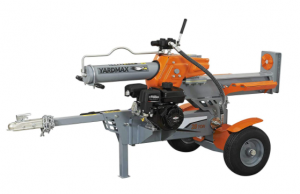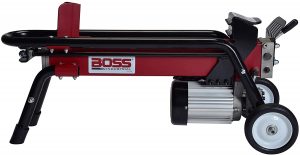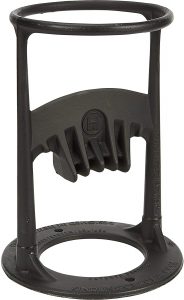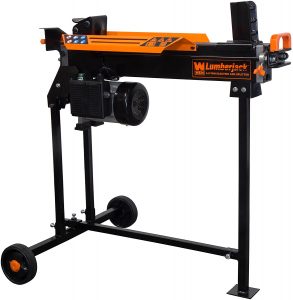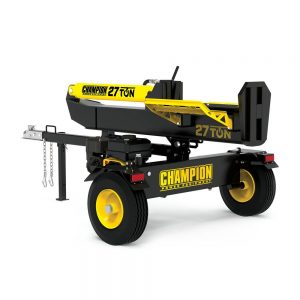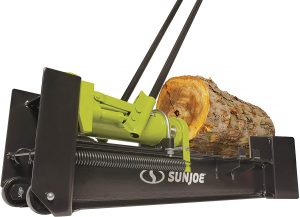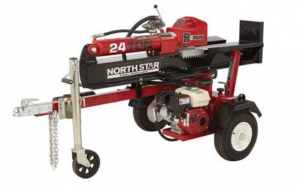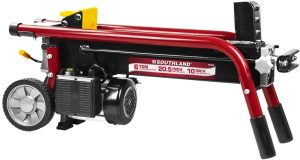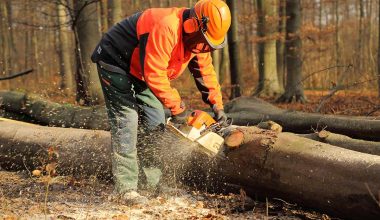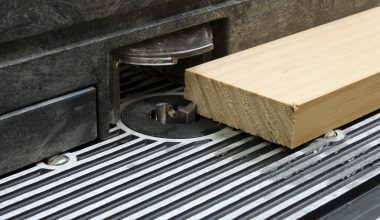Log Splitters: A Short Introduction
If you spend a lot of time cutting and splitting wood then a quality log splitter is a must-have. These machines will save you hours of work with an axe not to mention the exhaustion that comes with it!
Log splitters come in all shapes and sizes – ranging from high-capacity commercial machines to manual splitters. We look at the best performers across the main categories and help you find the perfect splitter for your needs. We’ll consider heavy-duty splitters, moderate-duty splitters, and splitters for kindling used on fires.
The Best Log Splitters: Our Picks
Best Performance
1. Yardmax YS2865 28-Ton 208cc Gas Log Splitter
Key Information
Log Diameter: 36in
Splitting Power: 28 tons
Machine Dimensions: 53 x 35.5 x 24.5 inches
Power Source: Gas
Our Rating
Check Price
Our Take
When it comes to all outperformance, the Yardmax is a beast. This machine will tackle huge logs, and has plenty of power to deal with some of the harder woods out there. If you’re in need of a powerful splitter, but don’t want to be spending $2000-$3000, then this is a great choice.
Digging into the details, this is a gas-powered machine equipped with a 6.5HP 208cc Briggs and Stratton engine. Hooked up to a hydraulic system, that gives you 28 tons of log splitting force, and the capacity to handle diameters up to 36in. With a rapid 13.2 second cycle time, you can move through jobs fast and safely.
As with most larger splitters, this machine is designed to be towed to the site, and features sturdy 16” wheels and a regular ball tow hitch. You can orient the splitter into a vertical or a horizontal configuration, and a 4-way splitter is included to produce smaller logs.
If you’re looking to purchase pure performance at a reasonable price, then this is an excellent option. While some of the smaller electric splitters are appealing, they can get outgunned on heavy duty applications, and will always need to be used near to a power supply.
Best Value
2. Boss Industrial ES7T20
Key Information
Log Diameter: 12in
Splitting Power: 7 tons
Machine Dimensions: 40 x 13.5 x 20.5 inches
Power Source: Electric
Our Rating
Check Price
Our Take
When it comes to a great tradeoff between cost, performance, and ease of use, you can’t go wrong with the ES7T20 from Boss Industrial. Hugely popular with online buyers, this machine offers substantial performance for most residential owners at a great price.
Taking a closer look, this is an electric splitter, which means it’s quieter and cleaner than its gas counterparts. Sure, that might mean a bit less power, but with it a tool you can just wheel out and start using. CA buyers will also be pleased that they don’t have to worry about emissions compliance.
From a performance perspective, this little machine will tackle logs up to 12in in diameter (some buyers have reportedly used it on larger wood). Splitting power is on the lower side, so it is best suited to residential use, or work on softer woods like pine. It’s relatively small and compact as splitters go, and should easily fit in the back of a pickup for transportation.
If you’re looking for a practical, compact and reasonably priced log splitter, this is a great choice. If you’re anticipating heavier usage, then take a look at one of the more powerful gas-powered machines.
Best For Kindling
3. Kindling Cracker Firewood Splitter
Key Information
Log Diameter: 6.5in
Splitting Power: N/A
Machine Dimensions: 9 x 13 x 9 inches
Power Source: Manual
Our Rating
Check Price
Our Take
Not all splitting involves creating firewood-sized logs, you need to make some kindling to light that fire too! That’s where the Kindling Cracker comes in, and it’s a firm favorite here at Workshopedia. Once you’ve tried this nifty accessory, you’ll be wondering why you hadn’t purchased one earlier.
A simple, yet sturdy design originating from Australia, the Kindling cracker helps to split small 6.5in logs into kindling in seconds. You simply place the log in the top of the cracker and hit it downwards with a mallet. The clever shape of the device splits these smaller logs, which are usually hard to balance and split with an axe. Not only is this machine more efficient, it actually helps avoid potentially dangerous work on smaller unstable logs.
Whether you’re looking for a secondary accessory alongside your splitter, a great gift, or something to split logs into kindling, then this a great purchase. With thousands of happy buyers online – you’ll wish you had picked one up sooner.
4. WEN 56207 Log Splitter
Key Information
Log Diameter: 10in
Splitting Power: 6.5 tons
Machine Dimensions: 38.5 x 28.2 x 39.2 inches
Power Source: Electric
Our Rating
Check Price
Our Take
A close competitor to the Boss splitter is the WEN 56207. This electric machine is a small to medium capacity log splitter designed for residential use. WEN has been growing rapidly in recent years, introducing a number of affordably-priced tools in a range of different applications. So, how does the 56207 stack up?
When it comes to splitting power, this log splitter is similar to the Boss unit, with a 6.5-ton splitting force. The bed has the capacity for logs up to 10in in diameter, which is very slightly smaller than the Boss machine. With a similar electric motor, both of these machines required a cable to power them, so you won’t be able to transport them to a site unless you have a generator.
With a 20 second cycle time, the WEN is also slightly slower than the Boss, which comes in at 14-seconds. Although it isn’t a huge difference, you could notice it when working through a large pile of logs. One clever innovation WEN have added is the two height options, allowing you to set the 56207 at waist height in high mode, or shin height in low mode. Those of us with back issues will certainly appreciate the high mode which should reduce bending over.
All in all, this is a solid splitter, and very similar to the Boss machine in many ways. While this machine has more versatile configurations, the Boss has a small edge in performance.
5. Champion Power Equipment 27 Ton 224 Cc Log Splitter
Key Information
Log Diameter: 12in
Splitting Power: 27 tons
Machine Dimensions: 89 x 52 x 39 inches
Power Source: Gas
Our Rating
Check Price
Our Take
Another high-powered log splitter, the Champion Power Equipment 27 Ton machine is probably best compared to the Yardmax. This machine is aimed at the prosumer, or heavy-duty buyer who needs a powerful and reliable unit.
This splitter comes equipped with a 224cc Champion brand motor, and DOT approved wheels for speeds up to 45mph. That package delivers 27 tons of splitting force, which you can configure into vertical or horizontal configuration. Ease of use was clearly a focus in the design, and Champion have included helpful frames on the side of the splitter to catch logs after splitting.
With an 11 second cycle time, this machine is no slouch, and will get the job done fast. Comparing it to the Yardmax, we can make a simple observation. If you’re looking for all-out power and capacity to split large logs, then the Yardmax is great. The Champion is faster however, and although it can’t handle logs as large, it comes with a number of useful features to make life easier.
In summary, we believe you can’t do far wrong with the Champion. It’s a sturdy, powerful machine that will help you power through big jobs as fast as possible.
6. Sun Joe LJ10M
Key Information
Log Diameter: 8in
Splitting Power: 10 tons
Machine Dimensions: 41.1 x 8.1 x 11.8 inches
Power Source: Manual
Our Rating
Check Price
Our Take
The only manual option in this review, the Sun Joe LJ10M is a little different from the rest. This is a manual machine that is assisted by a hydraulic ram to give you enhanced splitting power. Although perhaps not to everyone’s taste, this approach offers a cleaner approach than gas and more mobility than electric devices. It’s also quieter, so could be appealing in settings where noise is an issue.
Taking a closer look, you have 10 tons of splitting power with capacity for logs up to 8in. That is slightly smaller than the electric machines but actually more powerful. You pump both handles simultaneously to product hydraulic pressure in the ram and split the log.
It’s worth noting that this is a slow process, and you won’t get a cycle time close to the electric machines unless you have biceps of steel! What you give up in speed you gain in satisfaction however, as this machine delivers the same great feeling as using an axe. Perhaps better suited to the energetic crowd, this machine will give you a workout while you split your logs!
That manual setup does give you a compact machine, however, which is aided by two wheels located on the end of the device. In summary, this log splitter might be best seen as a unit to use alongside an axe for tricky jobs where gas and electrical power aren’t available. If you like to do it old school and break a sweat, this might be the machine for you.
7. NorthStar 24-Ton 160cc Log Splitter
Key Information
Log Diameter: 24in
Splitting Power: 24 tons
Machine Dimensions: 90 x 45 x 55 inches
Power Source: Gas
Our Rating
Check Price
Our Take
Designed to be used in a vertical or horizontal configuration, the NorthStar 24 Ton splitter is another heavy-duty machine. NorthStar have many years of experience under their belt when it comes to manufacturing yard tools – producing mowers and other machinery.
This is a powerful splitter – no doubt about it – but perhaps not as powerful as the Yardmax. With a GX160 Honda 160cc motor, you are getting slightly less power than the other two heavy duty options, and that is apparent in the slower 19 second cycle time. Still, with 24-tons of splitting capacity and the ability to handle logs up to 24in, this machine is respectable when it comes to performance. It is worth mentioning that Honda motors are among the most sought-after when it comes to reliability and performance, so that is certainly a plus.
This machine does have some sleek looks to it however, which do make it stand out from the crowd. NorthStar’s experience is clearly apparent in their careful shielding of cables and the clean and simple layout of the machine. Towing the unit is a breeze, with very high-quality wheels and sturdy road fenders fitted as standard. If you are a commercial buyer who typically brings a splitter to a site, then this machine is a solid choice.
8. Southland SELS60 6 Ton Electric Log Splitter
Key Information
Log Diameter: 10in
Splitting Power: 6 tons
Machine Dimensions: 37.7 x 11.8 x 18.5 inches
Power Source: Electric
Our Rating
Check Price
Our Take
Finally, we have the Southland SELS60, which is another small capacity splitter aimed at the residential market. With so many great options out there, it’s a tough field to compete in. While the SELS60 is a great piece of equipment, it doesn’t have the capacity and strong support from buyers online like some of the other machines in this review.
That said, taking a look at the details, this machine puts out a respectable 6 tons of splitting power from the corded electric motor. With capacity for logs up to 10in in diameter, you have enough power to get most jobs done, but not quite as much as the Boss or the WEN machines.
The compact shape of this machine and thoughtful wheel placement does make it exceptionally easy to maneuver and store, however. It can be rolled around very easily and stored in a vertical or horizontal position, depending on the space available. This makes the machine a good choice for tight garages, especially given these machines are heavy and difficult to lift.
With so many great machines out there, it’s always hard to stand out from the pack. The Southland is a good machine, but there are so many other fantastic options out there, we might not put this one at the top of our list.
What To Consider When Buying A Log Splitter
There’s a lot to consider when buying a log splitter – so just what should you pay attention to? As with any tool, it depends on your usage. In this section, we’ll discuss some of the key features to consider.
Splitting Power
First up, you need to ask yourself how much splitting power you’ll need. This depends on several factors but is mainly a function of the size of logs you want to cut. If you have large trees to fell, or logs to split, you’ll need a high-power capacity, measured in tons. We recommend using your chainsaw chaps when using a log splitter to protect you from flying debris.
Another factor that affects your splitting power requirement is the type of wood you are splitting. For softwoods, such as pine, you don’t need much power. But for hardwoods like oak, you’ll need a powerful log splitter to get the job done. We recommend roughly 7 tons for residential users, and 25 tons and up for light commercial and heavy-duty home use.
Log Size Limits
Linked to splitting power is the size of logs your machine can take. Smaller machines can naturally only accommodate small logs, and often don’t have the power to split large diameter logs anyway.
Typically, log size capacity is pretty closely linked to splitting power, so we recommend choosing the correct power rather than worrying about log size too much.
Gas Vs Electric Log Splitter
Generally, the more powerful log splitters are gas-powered. While this isn’t a hard and fast rule, it’s more or less true across the board. As we mentioned earlier in this section, choosing the correct power is key.
Some buyers don’t need the power of a full gas splitter, and in those cases, we do recommend considering an electric model. Electric machines don’t have the hassle or mess of a gas motor. Plus you can just plug them in and get going. What’s more, you don’t have to worry about emission and noise restrictions. For the same reasons you might also be interested in an electric chainsaw if you are using an electric log splitter.
Cycle Time
Cycle time is the time it takes to complete a log split. Although crucial in commercial settings, we don’t think it’s a huge consideration until you reach 20 seconds or more per cycle. These days, most good gas and electric splitters can get the job done in less time. That said, it’s worth keeping an eye out for the specifications of any splitter you look at.
Mobility
Some buyers will use their splitter outside their garage, and mobility won’t be a problem. Other buyers might need to trailer their splitter to a different location every time they use it.
It’s worth giving some careful thought to how you’re going to be using your splitter, and what your requirements are. Bear in mind that the towable splitters are also generally much larger. So you’ll need much more space in your shed or garage.
On the topic of garage tools, you might want to check out our guide to garage air compressors after picking a log splitter.
Configuration
Some splitters can be set up to work vertically as well as horizontally. This can make your life significantly easier, particularly when tackling heavy logs that you can’t lift. If you need a powerful high capacity log splitter, the chances are you will be splitting large logs, so we recommend looking for a splitter that works both vertically and horizontally.
Log Splitter Buyer’s Guide FAQs
Buyers typically have so many questions when purchasing a log splitter. Here are some of the most common questions we’ve seen.
What is the best log splitter for the money?
As with any product, the best splitter for the money does depend on what you are using it for. For a residential buyer, saving on cost might be a good idea, but for a heavy-duty user that could be a big mistake. What’s more, purchasing a cheap splitter that then breaks is more expensive than purchasing the right splitter on the first shot.
For a regular residential buyer, we recommend the Boss Industrial ES7T20. This is a very affordable machine and offers great power for its size. It’s compact, electric powered, and has a huge number of very happy buyers online. If you’re looking to split smaller logs this machine offers a good amount of power to get the job done. What’s more, you don’t have the noise and hassle of a gas motor.
If you have a lot of splitting to do, or you work in a commercial setting, then we recommend the Yardmax 28-Ton log splitter. This machine offers tons of power from the gas motor, is highly reliable, and offers great mobility too. It can be configured in a horizontal or vertical setting to suit your needs and has plenty of power on tap.
How big of a log splitter do I need?
There are many complex tables and calculations online to find out how much power you need, but we’ll simplify this into two choices.
If you are splitting logs up to 12-inch in diameter, in a residential or light use setting, we recommend about 7 tons of splitting power. This should cover you for wet and dry wood, along with the different hard and softwoods.
If you are going overtime with your gas saw or heavy-duty multi-hour use, we recommend you look at a 25-ton splitter. These machines will enable you to tackle the biggest logs, and are much more durable than the electric splitters.
Are electric log splitters any good?
Yes, we believe they are, but they aren’t for everyone. Electric splitters are smaller, cleaner, quieter, and easier to use than gas splitters. This makes them a great choice for residential and occasional users who don’t need the power of a gas machine.
All that considered, if you split a lot of logs in a heavy-duty setting, you’re going to need a gas-powered splitter. These machines are much more powerful and will help you split large logs with ease.
What’s the best electric wood splitter?
We recommend the Boss Industrial ES7T20 if you are looking for a solid electric splitter. This machine is reasonably priced, powerful, and very well reviewed by hundreds of buyers online. With 7 tons of log splitting capacity, there is plenty of power on tap. Plus you can tackle logs of a decent size.
What is the best kinetic log splitter?
Kinetic log splitters are a different design that uses a mechanical gearbox. Compared to the hydraulic system used in the gas-powered splitters discussed here. The main advantage of this approach is the much faster cycle time. This is highly desirable in sawmills and other commercial applications.
That said, these machines are much more expensive, and typically retail for $2000 or more. We have not included any, because we think they are best suited to the heaviest duty commercial buyers.
